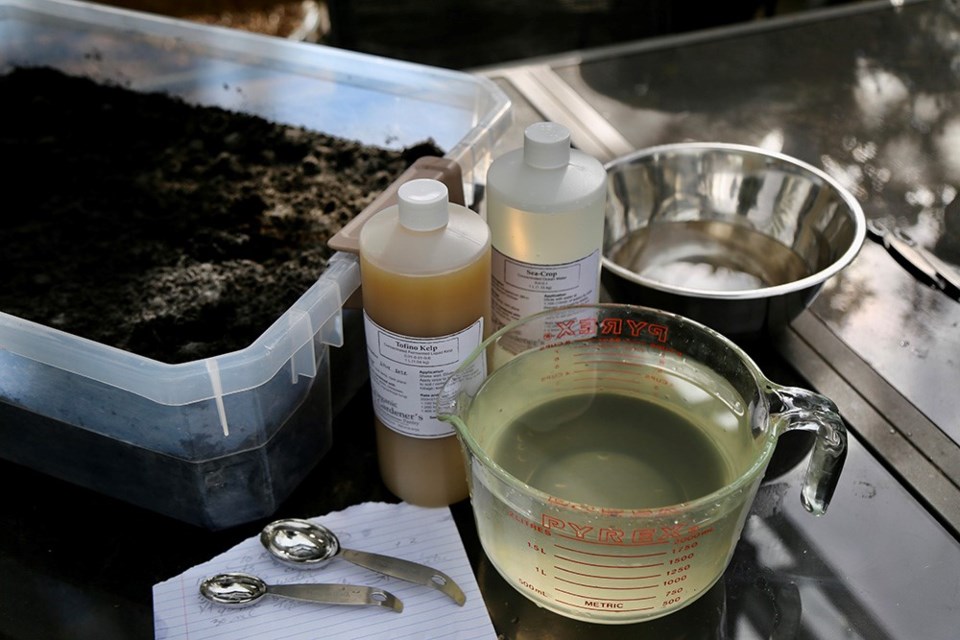We are seed starting a bit late this year; in part because I was waiting for my biochar to "bloom," but primarily due to elevation. We are located just above the "snow day" snowline, so our garden soil warms somewhat slower than the soil down below.
Jack Frost, I’ve learned, doesn’t like to be rushed.
Like most winter-weary gardeners, I have seed started indoors and outdoors too early in the season, to no benefit, and often to great detriment. Most seedlings, like most children, catch up in the end, so there is no point and certainly no fun in working them too hard, too soon.
Also like children, seedlings need complex nutrients from the get go, to thrive.
On that note, and based more-or-less entirely on instinct, we do not indoor seed start in the sterile soil-less environment suggested by contemporary wisdom. I add worm castings, and plenty of them, to a simple professional mix with perlite, and we fertilize post-germination with a very weak worm compost tea. So far, so good.
When seed starting outdoors in our old greenhouse, we use sifted organic compost and worm castings, and once seedlings are established, we fertilize with a soluble kelp solution and weak compost tea.
On occasion, in the greenhouse, I will see some surface greening of the soil, but we have never had problems with mold, or gnats, or any other sort of soil-specific trouble. Water, light, temperature and ventilation are important variables of course, individually and in combination, and those too should be considered, I believe, in relation to natural ecosystems.
I cannot empirically defend our non-standard choices, rather I share them with you for consideration. It makes sense to me to follow nature’s logic whenever possible. Plants need living soil to thrive without synthetic intervention. Granted, I don’t want an active compost inside my home, so adding worm castings from a castings farm (not from my in-bed worm composts) seems a safe enough bet.
Beneficial biochar
I have been adding compost-activated biochar to my garden soil, but this year we are adding biochar to all seed starting mixes as well, at a rate of 15 per cent by volume. Permaculturists and manufacturers recommend a ratio of 10 per cent to 20 per cent activated biochar to organic compost (or soil), as biochar is known to attract and retain both water and essential nutrients.
Robert Lavoie, founder of AirTerra Biochar in Alberta recommends adding a small amount of flour to biochar as a carbohydrate source for microbes to munch on, along with rainwater (or de-gassed tap water), to compost (or castings), to kick-start inoculation (activation). I contacted Robert to ask if he had a carb recommendation other than flour, as I was concerned that indoors, in an artificial growing environment, moist flour might lead to mould.
Robert suggested that we replace flour with a small amount of unsulphured molasses dissolved in rainwater, to moisten the worm casting-enriched biochar. I followed his advice and within two weeks was rewarded with a bin full of beautifully bloomed biochar, well on its way to its forever home in our gardens.
But I couldn’t stop there, soil biology junkie that I am. I contacted Christina Nikolic, a certified organic land care professional and Gaia College instructor, to solicit her thoughts on adding a native, preferably soluble, version of complete organic fertilizer (COF).
Deep sea goodness
Christina told me that she too uses unsulphured molasses as a carbohydrate source for microbes, and suggested that I also add Tofino Kelp, a fermented liquid kelp fertilizer-probiotic hybrid, and Sea-Crop, a concentration of over 80 natural source minerals and active organic substances from the deep sea, to my biochar mixture.
Christina is an organic soil biology guru of sorts and didn’t seem at all critical of my non-conventional seed starting practices. Of course then, I liked her instantly.
I am hopeful that I am on the right track with my super-charged seed starting “soilution,” but only time will tell. The wild card of course is the artificial environment. To that end, I am running side-by-side trials, comparing the activated biochar-charged medium against a control batch of my regular professional mix plus worm castings. I promise full disclosure.
To learn more about the specialized products described above, contact: AirTerra Biochar or Canadian AgriChar and Organic Gardener’s Pantry.
Laura Marie Neubert is a West Vancouver-based urban permaculture designer. Follow her on Instagram @upfrontandbeautiful, learn more about permaculture by visiting her Upfront & Beautiful website or email your questions to her here.
VIDEO | Tips for starting your own urban permaculture garden.
(Video - Courtesy of West Vancouver Memorial Library)



